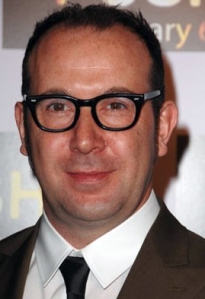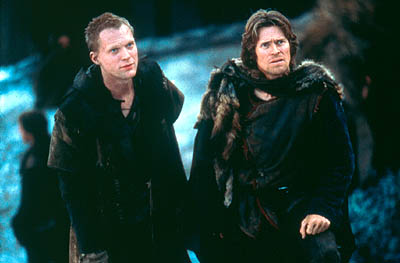UPDATED: Exclusive Interview – Paul McGuigan talks modern day Sherlock Holmes, Deathlok, Bond, Grant Morrison and more
Posted by LiveFor on February 22, 2010
 Scottish director Paul McGuigan made his name with British gangster film, Gangster Number 1 before moving across to the States where he worked with big names such as Josh Hartnett, Bruce Willis and Morgan Freeman in Lucky Number Slevin. With his energetic and unique visual style, McGuigan is one of the biggest Scottish directors working in Hollywood today. We were lucky enough to catch up with Paul to discuss his previous films and his upcoming projects. Richard of LFF took the interview so without further ado over to Rich.
Scottish director Paul McGuigan made his name with British gangster film, Gangster Number 1 before moving across to the States where he worked with big names such as Josh Hartnett, Bruce Willis and Morgan Freeman in Lucky Number Slevin. With his energetic and unique visual style, McGuigan is one of the biggest Scottish directors working in Hollywood today. We were lucky enough to catch up with Paul to discuss his previous films and his upcoming projects. Richard of LFF took the interview so without further ado over to Rich.
When I call, he is taking a break from editing his latest project; a modern day take on Sherlock Holmes for the BBC with Benedict Cumberbatch as Holmes and Martin Freeman as his loyal sidekick Watson. Three feature length episodes are planned; McGuigan will direct the first due out in the autumn.
(Noise)
PM: Sorry, I’m editing next to Dr Who, there was a big meeting today it’s a bit noisy
McGuigan eventually finds a quite spot in the corner and I open by trying to grab some information about the rumours surrounding his next film.
LFF: So I heard some news about a new project this morning, can you talk about it?
PM: Well I’m hoping to sign on in the next few days.
LFF: It’s written by the guys that did The Hangover, right?
PM: Yeah, it’s their next film.
LFF: Is it a flat out comedy?
PM: It’s a comedy thriller. But I’m waiting until the ink has been dried on the contract before I can really start talking about it.
LFF: Of course. So I was going to start by talking about some of your older films, The Acid House was your first feature, right?
PM: It was yeah, it was three short stories. I initially directed one short called The Granton Star Cause and it did pretty well on Channel 4 so they wanted to do all three. I’d only done documentaries before and was a photographer before that, so when Irvine Welsh asked me to do it, I initially turned it down because it wasn’t what I was used to doing. But then he told me about the story about the man having a bad day, meeting God in the pub and it was just crazy! I thought if it’s going to fail I may as well go out in a blaze of glory. It turned out to be such fun to do, Channel 4 wanted it to be a proper Irvine Welsh story and not filter it for an English audience. It was fun.
LFF: So after that you made Little Angels (a docu-drama focusing on heroin addicts) and Gangster Number 1. Along with The Acid House, did you get the feeling you were marked as a controversial director?
PM: Aye, but I’d say life is pretty controversial, I mean you’re going to come cross times when you’re not in a good place. Sometime real life is not filtered through on to the screen in the way some people would like it to. Life imitates art whereas art never usually imitates life and art always imitates art if you will, so for a genre like gangster films the only reference points we have of gangsters are through the cinema, and we just keep copying ourselves which means we portray gangsters in a certain way. But that’s fine that’s a good way of getting to an audience because they are comfortable with that, it’s what they are used to, but then you have to start breaking down some of the barriers of it. The lifestyle isn’t always glamorous; it can be ugly and violent. I always think violence is a hard thing for a director to portray; I don’t want to advocate it’s like pornography where you get off on it because that’s not the case. Violence to me is always the sounds and the hatred in the person perpetrating the violence. So what I wanted to do (In Gangster) was kill the audience that were watching it, you don’t see much when Paul Bettany strips naked and butchers the guy with an axe, but it’s still a very violent scene. I didn’t want to let the audience off with that you know? I wanted to show that violence was not glamorous. It’s also hard trying to find new ways to shoot violence, give it an original point of view to all the others.
LFF: Even though a lot of people really like Gangster Number 1, do you think it’s a bit underrated?
PM: I think a lot of my films are. Any director will tell you that about their movies. It seems to take time for people to find my movies. It’s like Lucky Number Slevin, it didn’t make millions at box office but then went on to make a ton on DVD. It’s almost like people found it and went “oh I’ve found this cool movie” and then claim it for themselves. It was the same with The Acid house.
LFF: I think I know what you mean. I stumbled across Wicker Park in Blockbuster, had never heard of it but I went on to enjoy it.
PM: Yeah It’s strange. I don’t think my style is as palatable to a mainstream audience marketable and it is to certain people. Production companies always seem to find them hard to market. Its like, “is Wicker Park a love story? Is it a thriller?” Well no, it’s not a love story because if it was a love story I would have shot it differently, so yeah it’s a thriller. So they always seem to have a problem marketing it.
LFF: I was reading up on a film called The Reckoning but I had never heard of it.
PM: Well the reckoning is a prime example of bad marketing. I’m working with the likes of Martin Freeman and Benedict and they have never heard of it, it’s about the birth of modern day theatre you’d have thought they might have seen it! (laughs) It’s not bad, beautiful looking film, but it’s quite an art house movie, I wasn’t trying to make a mainstream film I just wanted to make a film about something I thought was interesting.
LFF: It boasts a great cast too.
PM: Yeah it’s got Paul Bettany, Vincent Cassell is in it, Wilem Defoe, Brian Cox.
LFF: I can’t seem to find it anywhere!
PM: (laughs) well there you go! But essentially it’s an expensive art house film lets put it that way, ill hold my hands up and say that’s what it is. But after that I realised I just needed to concentrate on what I’m best at and try and make films people want to see.
LFF: So after that you moved to the US, was it Gangster that brought you attention from America?
PM: Yeah it definitely was, it was a great calling card. I got a call from Robert Newman and he said it was getting a great reaction. After that I got the chance to meet Bruce Willis and some other big actors who said they wanted to work with me, and later on they came true to their word and worked with me on different projects over the years. But it still is a great calling card, people really like it.
LFF: After you completed Wicker Park in the US, would you say Slevin cemented you over there?
PM: To be honest it’s all indie companies I’ve worked for so I’ve always been on that side of the fence. Even with Push, I’ve never a studio movie.
LFF: I assume the next one will be for a studio?
PM: It’s not like I go out of my way to avoid it. I have been attached to various Marvel projects to James Bond.
LFF: Really?
PM: Yeah for Casino Royale. I was down to the last two, it would have been great and I haven’t given that one up just yet. Not like playing for Glasgow Celtic or playing in front of a crowd at the Barrowlands, some things you have to give up (laughs) but that’s not one of them.
LFF: Who would you cast as Bond?
PM: I think James McAvoy would be great. Daniel Craig is very good though. The thing that I didn’t like about Quantum of Solace is it took itself too god damn seriously. There’s a great sense of fun attached to Bond films and that has to be embraced, you can be serious when it’s required, but you just have to relax a bit.
LFF: Another project you were linked to was DeathlokPM: Deathlok was just taking too long in development. David Self wrote it and it was a great script, the hardest thing bout Deathlok and this sounds crazy but was to get the idea of Knight Rider out of my head! Just couldn’t get over that. I really wanted to do that film but I had to put on the backburner.
LFF: But you got to kind of make a ‘superhero’ film with Push.
PM: I suppose so, yeah, but I never really approached it that way. Push was me wanting to do an action film, you know? Before the Acid House I never watched Trainspotting, so I never watched X Men or anything like that which might have influenced the way I do things, I just like to do my own thing. But obviously certain people and studios always want certain things in there.
LFF: Push isn’t as glossy, if you will, compared to other ‘superhero’ films
PM: I would have made it grittier if I could have! But what you have to remember is with these ‘superhero’ films if you want to call them, is that you’re up against these big budget pieces with the greatest technologies available. Push was made for $25m, which is a lot of money, but that’s not much compared to those films which are up to £100m now. But that shouldn’t put off and I think it’s a pretty cool movie.
LFF: So let’s talk about Sherlock again, is it anything with Guy Ritchie’s recent film?
PM: No. It’s written by Steven Moffat who does Doctor Who and Mark Gatiss from League of Gentlemen. They are big fans and wanted to do an updated version, he has to be smarter now he’s up against all this new technology. I think it’s harder to make him modern and immediate being set in the present day rather than back in the olden days. I thought Guy Ritchie’s film was entertaining, but that’s what it has to be as a lot of people see it as a bit of a romp. But we want to bring it back to the clever detective side. The BBC are putting a bit of a wedge behind it so hopefully it will do well.
LFF: So no pipes and hats then?
PM: (laughs) No, no hats, but I thought that might be cool. He’s covered in nicotine patches and that kinda stuff. It pays homage to the originals, it still feels like Baker Street but with plasmas televisions.
LFF: The Acid House is still the only thing you have filmed in Scotland, would you be interested in making something else there?
PM: Yeah Grant Morrison and myself are working on, I wouldn’t call it a secret project, but a project with Stephen Fry and it’s a thriller set in Scotland. Me and Grant have been friends for a while and we wanted to do something together and Grant went off and wrote a treatment, so it’s at the treatment stage at the moment.
UPDATE: The show is going to be called Bonnyroad according to Bleeding Cool. END OF LINE
LFF: Is it a full series?
PM: It’s seven episodes. It takes place over seven days around an event that happens in Scotland. It’s a modern take on an old fable or fairy story. If you know Grants work you might have an idea of what it will be like. It’s like Twin Peaks meets Brigadoon! It’s off the wall and smart but in a watchable commercial way. It’s still in the early stages but I’m very excited about it.
LFF: There’s still not a large amount of ‘big’ Scottish directors out there at the moment.
PM: I think we quietly work away, you’ve got MacKenzie and Peter Mullan who I think is great, he has a story to tell. So not quite a full squad yet, we’ve probably got a five a side.
LFF: Do you think more could be done to help develop talent?
PM: There has to be grassroots. Eighteen year olds will look at it and think, “I can’t see a career for me here”, so they make it creating video games and things like that. We need to change that mindset and get back into it. I read some stats the other day and it said film and television in Scotland work an average of seven days a year, that’s no career it’s almost a hobby. It’s sad. But the BBC seem to be keen in putting some money in and hopefully it’s just a bump in the road. There’s some great talent up here, it just needs to be harvested.
LFF: Mark Millar is rumoured to be writing a Scottish superhero tale. Would a film version interest you?
PM: Mark’s a talented boy, but I don’t think he will work with me after I slagged off his last film, Wanted. I never insulted him directly because he didn’t even write the screenplay and I wouldn’t intentionally slag off someone else’s work but certain people stirred it up. The funniest part was when Morgan Freeman, who I adore, started talking about the weavers or something. I just wanted to pause it and rewind it in the cinema and say, “sorry, are they trying to tell us this makes any sense?!” But good luck and good power to the man.
Check out the other LFF interviews including Duncan Jones, Mike Sizemore, Johnny Depp, Tony Grisoni, Michael Marshall Smith, Neal Asher, Leslie Simpson and more.











“Twin Peaks meets Brigadoon” – Grant Morrison and Stephen Fry’s TV project | The Forbidden Planet International Blog Log said
[…] mag draws our attention to an interview on LiveForFilm with director Paul McGuigan where he talks a little about the upcoming TV project he is working on […]
Rich said
Great interview Phil, Grant Morrison, Stephen Fry and Paul McGuigan together sounds interesting!
Stephen Fry Teams with Grant Morrison and Paul McGuigan for ‘Twin Peaks Meets Brigadoon’ TV Series | /Film said
[…] not a lot of detail on the show, which is in the treatment stage right now. In an interview with Live For Films, McGuigan is quoted saying “Grant Morrison and myself are working on, I wouldn’t call it a […]
GOMA DE MASCAR! » Blog Archive » Mini-série da BBC unirá Paul McGuigan, Stephen Fry e Grant Morrison said
[…] site Live For Film entrevistou McGuigan enquanto ele editava o seu SHERLOCK HOLMES, uma nova série com roteiro de Steven Moffat […]
Jerry Simpson said
Does Paul McGuigan realize that the MGM disc of “Wicker Park” is TERRIBLE? Really, “Wicker Park” is a GREAT movie, but the disc version is chopped so thoroughly that I really think it is unforgivable. He ought to be able to sue MGM. And not-so-incidentally, MGM is now in bankruptcy. Relevant here is that movie are popular if people recommend them to their friends, but no one who sees the disc version is going to recommend it. No wonder MGM is in bankruptcy.